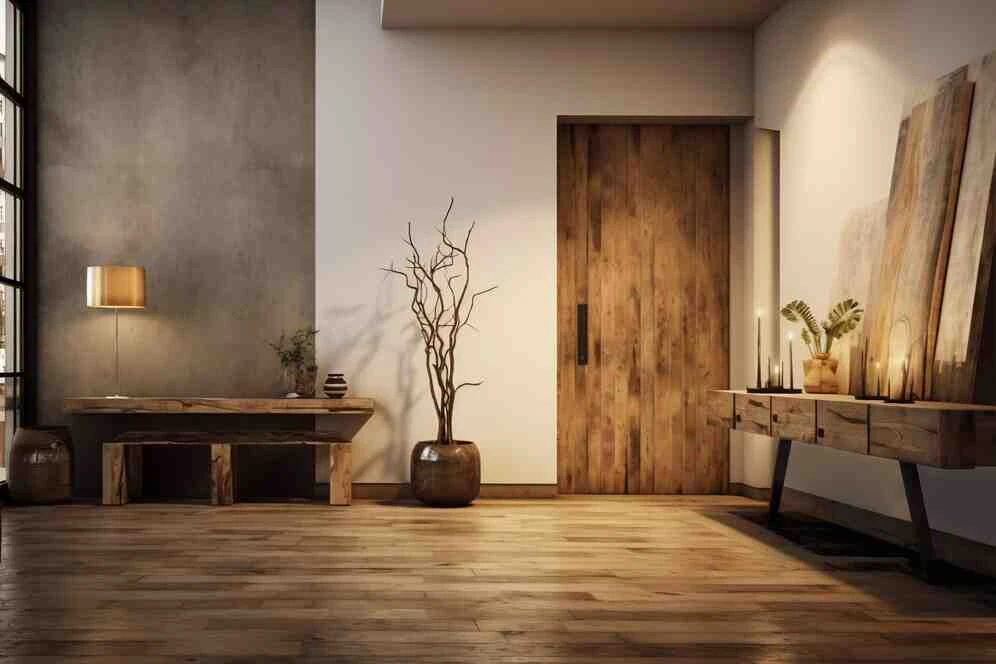-
Bamboo Flooring
Bamboo has garnered significant attention in recent years as a sustainable alternative to hardwood flooring. It grows rapidly, making it an abundant and renewable resource. Bamboo flooring is also durable and easy to maintain. It offers an elegant and timeless look that complements various architectural styles.
Recommendation: Teragren Portfolio Naturals Bamboo Flooring - This product stands out for its quality and variety of finishes, ensuring a beautiful and eco-friendly addition to your home.
-
Recycled Glass Countertops
Countertops made from recycled glass are not only visually stunning but also environmentally friendly. These countertops are composed of recycled glass shards and resin, making them durable and resistant to stains. They come in various colors and can be customized to suit your kitchen or bathroom design.
Recommendation: Vetrazzo Recycled Glass Countertops - Vetrazzo offers a wide range of attractive countertop options, each crafted from 85% recycled glass and suitable for both residential and commercial spaces.
-
Cork Wall Tiles
Cork is a sustainable material harvested from the bark of cork oak trees. Cork wall tiles offer excellent sound insulation and thermal properties, making them a fantastic choice for interiors. They are easy to install and available in various patterns and colors.
Recommendation: AmCork Cork Wall Tiles - Known for their quality and eco-friendliness, AmCork offers a range of cork wall tiles that can add a unique and sustainable touch to your space.
-
Reclaimed Wood
Reclaimed wood is sourced from old barns, factories, and warehouses, reducing the demand for newly harvested trees. It adds character and warmth to any space, with each piece telling a unique story. Reclaimed wood can be used for flooring, furniture, and wall paneling.
Recommendation: The Reclaimed Wood Shop - This supplier offers a wide variety of reclaimed wood species and finishes, allowing you to choose the perfect fit for your project.
-
Recycled Steel
Steel is a widely used material in construction, but using recycled steel can significantly reduce its environmental impact. Recycled steel is just as strong and durable as virgin steel but requires significantly less energy to produce.
Recommendation: ReSteel Supply - They specialize in providing high-quality recycled steel products for various construction needs, from structural framing to roofing.
-
Solar Reflective Roofing Materials
Solar-reflective roofing materials, such as cool roofs and white roofing membranes, are designed to reflect sunlight and reduce heat absorption. This helps in lowering energy consumption by reducing the need for air conditioning and prolonging the lifespan of the roof.
Recommendation: GAF EnergyCool™ - GAF offers energy-efficient roofing materials that can help reduce cooling costs and contribute to a more comfortable indoor environment.
-
Straw Bale Construction
Straw bale construction is an ancient building technique that is regaining popularity due to its sustainability. Straw bales are used as insulation within a frame, offering excellent thermal performance. This method also utilizes locally sourced materials, reducing transportation emissions.
Recommendation: Consider consulting with a local architect or builder experienced in straw bale construction for personalized recommendations and designs.
-
Rammed Earth Walls
Rammed earth is a technique that involves compressing earth, chalk, lime, or gravel into solid walls. It has a timeless aesthetic and excellent thermal mass properties, helping to regulate indoor temperatures naturally.
Recommendation: Seek out local builders or contractors with experience in rammed-earth construction to ensure proper design and construction practices.
Selecting sustainable building materials is a crucial step in reducing the environmental impact of construction projects while promoting healthier living spaces. From bamboo flooring to rammed earth walls, there are numerous eco-friendly options available for various building needs. When choosing sustainable materials, consider factors such as durability, energy efficiency, and local availability to make the most responsible choices for your project. By incorporating these materials into your construction or renovation plans, you can contribute to a more sustainable and environmentally conscious future.











